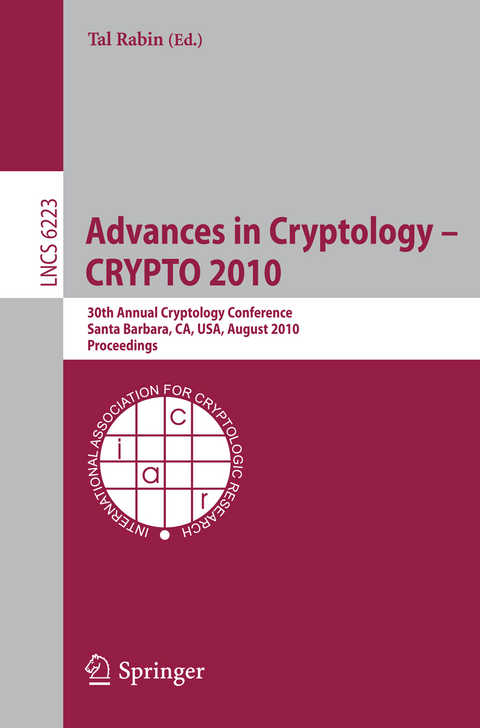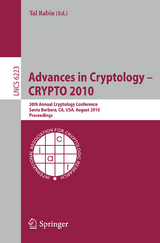Advances in Cryptology -- CRYPTO 2010
Leakage.- Circular and Leakage Resilient Public-Key Encryption under Subgroup Indistinguishability.- Leakage-Resilient Pseudorandom Functions and Side-Channel Attacks on Feistel Networks.- Protecting Cryptographic Keys against Continual Leakage.- Securing Computation against Continuous Leakage.- Lattice.- An Efficient and Parallel Gaussian Sampler for Lattices.- Lattice Basis Delegation in Fixed Dimension and Shorter-Ciphertext Hierarchical IBE.- Homomorphic Encryption.- Toward Basing Fully Homomorphic Encryption on Worst-Case Hardness.- Additively Homomorphic Encryption with d-Operand Multiplications.- i-Hop Homomorphic Encryption and Rerandomizable Yao Circuits.- Theory and Applications.- Interactive Locking, Zero-Knowledge PCPs, and Unconditional Cryptography.- Fully Secure Functional Encryption with General Relations from the Decisional Linear Assumption.- Structure-Preserving Signatures and Commitments to Group Elements.- Efficient Indifferentiable Hashing into Ordinary Elliptic Curves.- Key Exchange, OAEP/RSA, CCA.- Credential Authenticated Identification and Key Exchange.- Password-Authenticated Session-Key Generation on the Internet in the Plain Model.- Instantiability of RSA-OAEP under Chosen-Plaintext Attack.- Efficient Chosen-Ciphertext Security via Extractable Hash Proofs.- Attacks.- Factorization of a 768-Bit RSA Modulus.- Correcting Errors in RSA Private Keys.- Improved Differential Attacks for ECHO and Grøstl.- A Practical-Time Related-Key Attack on the KASUMI Cryptosystem Used in GSM and 3G Telephony.- Composition.- Universally Composable Incoercibility.- Concurrent Non-Malleable Zero Knowledge Proofs.- Equivalence of Uniform Key Agreement and Composition Insecurity.- Computation Delegation and Obfuscation.- Non-interactive Verifiable Computing:Outsourcing Computation to Untrusted Workers.- Improved Delegation of Computation Using Fully Homomorphic Encryption.- Oblivious RAM Revisited.- On Strong Simulation and Composable Point Obfuscation.- Multiparty Computation.- Protocols for Multiparty Coin Toss with Dishonest Majority.- Multiparty Computation for Dishonest Majority: From Passive to Active Security at Low Cost.- Secure Multiparty Computation with Minimal Interaction.- A Zero-One Law for Cryptographic Complexity with Respect to Computational UC Security.- Pseudorandomness.- On Generalized Feistel Networks.- Cryptographic Extraction and Key Derivation: The HKDF Scheme.- Time Space Tradeoffs for Attacks against One-Way Functions and PRGs.- Pseudorandom Functions and Permutations Provably Secure against Related-Key Attacks.- Quantum.- Secure Two-Party Quantum Evaluation of Unitaries against Specious Adversaries.- On the Efficiency of Classical and Quantum Oblivious Transfer Reductions.- Sampling in a Quantum Population, and Applications.
| Erscheint lt. Verlag | 30.7.2010 |
|---|---|
| Reihe/Serie | Lecture Notes in Computer Science | Security and Cryptology |
| Zusatzinfo | XIV, 744 p. 63 illus. |
| Verlagsort | Berlin |
| Sprache | englisch |
| Maße | 155 x 235 mm |
| Gewicht | 1098 g |
| Themenwelt | Informatik ► Theorie / Studium ► Kryptologie |
| Schlagworte | aes • Algebraic Geometry • authentication • Block Ciphers • collision resistance • Complexity • cryptography • Embedded Systems • Hashing • Internet • Permutation • security • Trust |
| ISBN-13 | 9783642146220 / 9783642146220 |
| Zustand | Neuware |
| Informationen gemäß Produktsicherheitsverordnung (GPSR) | |
| Haben Sie eine Frage zum Produkt? |
aus dem Bereich




